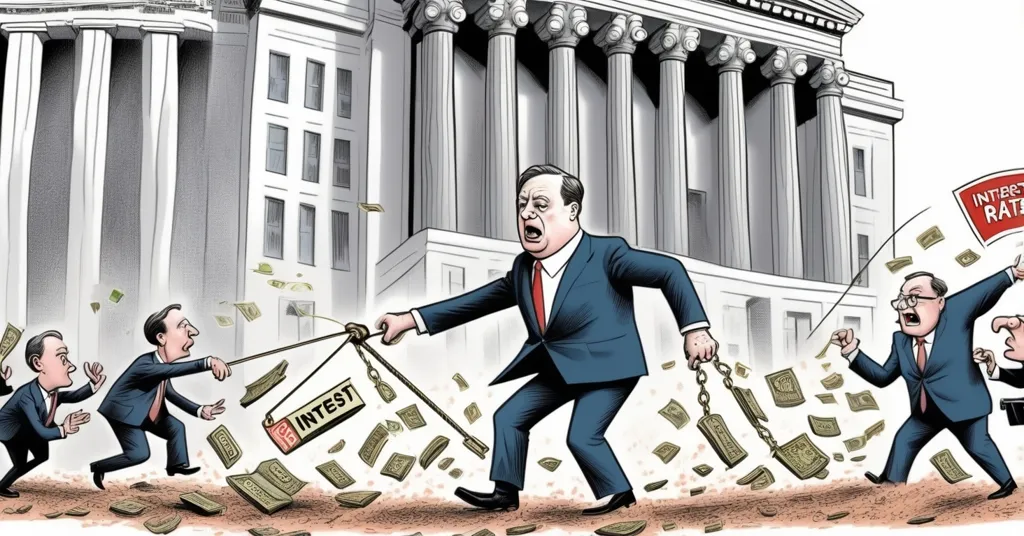Elizabeth Warren Warns: Firing Jerome Powell Risks Market Crash

Firing Jerome Powell Could Crash Markets, Warns Elizabeth Warren
Senator Elizabeth Warren has raised alarms about the potential economic fallout from President Donald Trump’s threats to fire Federal Reserve Chair Jerome Powell, cautioning that such a move could trigger a financial market crash.
- Warren warns of market crash if Powell fired
- Trump’s push for lower interest rates
- Fed’s independence crucial for stability
Speaking at the New York Stock Exchange, Senator Warren made it clear that firing Jerome Powell would be disastrous for the economy. “If Chairman Powell can be fired by the President of the United States, it will crash the markets,” she stated firmly. Warren underscored that the Federal Reserve’s independence from political interference is not just vital for the US but for the global financial system as well. “The infrastructure that keeps this stock market strong and, therefore, a big part of our economy strong, and a big part of the world economy strong, is the idea that the big pieces move independently of politics,” she explained.
The Federal Reserve, often referred to simply as “The Fed,” is the central bank of the United States. Its independence means it can make monetary policy decisions without direct influence from the government, aiming to maintain economic stability. Interest rates, which are set by the Fed, influence the cost of borrowing and the overall economic environment. Lower interest rates typically encourage borrowing and investment, boosting economic activity, while higher rates can slow down the economy by making borrowing more expensive.
Trump’s ongoing feud with Powell centers on his desire for lower interest rates, which he believes would stimulate the economy and benefit asset prices, including cryptocurrencies. Lower rates are generally favorable for risk-on assets—those that investors turn to when they’re willing to take more risks—as they encourage investment and increase liquidity. Trump’s frustration with Powell’s cautious approach to rate cuts has led to repeated public calls for his termination. However, Warren pointed out that Trump lacks the legal authority to remove Powell, citing Powell’s statement that early firing by a president is “not permitted under the law.”
Supporting Trump’s stance, Senator Rick Scott from Florida has also called for Powell’s removal, criticizing his leadership and advocating for a Federal Reserve that focuses on American interests. Scott’s remarks resonate with some political circles that believe the Fed should align more closely with the administration’s economic goals. “It’s time to clean house of everyone working at the Federal Reserve who isn’t on board with helping the American people and fighting for their best interests,” Scott declared.
The tension between Trump’s administration and the Federal Reserve highlights a broader debate over central bank autonomy versus political influence. Market analyst Anthony Pompliano even suggested that Trump might have intentionally crashed markets to pressure Powell into lowering rates. Meanwhile, the yield on the 10-year US Treasury Bond, a key indicator of market sentiment, dropped to 4% before climbing back to 4.3%.
In the realm of cryptocurrencies, Trump’s push for lower rates could have significant implications. Bitcoin and other digital assets often thrive in environments with low interest rates, as investors seek higher returns in riskier assets. However, the stability of traditional financial markets plays a crucial role in the confidence of crypto investors. A market crash triggered by political interference in the Fed could create a ripple effect, impacting not just stocks but also the burgeoning world of decentralized finance.
As advocates of decentralization and financial freedom, it’s important to consider the broader implications of these political maneuvers. While Bitcoin and other cryptocurrencies offer a hedge against centralized financial systems, the stability of those systems remains a key factor in their adoption and growth. The potential for a market crash due to political interference underscores the importance of maintaining the Fed’s independence, even as we champion the disruptive potential of blockchain technology.
Key Questions and Takeaways
- What are the potential consequences of firing Jerome Powell?
Firing Powell could crash financial markets due to undermined investor confidence and weakened financial infrastructure.
- Why does Donald Trump want to fire Jerome Powell?
Trump believes Powell’s hesitancy to lower interest rates is detrimental to the economy and asset prices.
- How does the Federal Reserve’s independence impact financial markets?
The independence of the Federal Reserve is crucial for maintaining investor confidence and the stability of both the US and global economies.
- What role do interest rates play in the cryptocurrency market?
Lower interest rates are generally considered positive for risk-on assets, including cryptocurrencies, as they can increase liquidity and investment in these markets.
- What is the significance of the 10-year US Treasury Bond yield?
The yield on the 10-year US Treasury Bond reflects market reactions to economic policies and expectations. A decrease to 4% and subsequent rise to 4.3% indicate market volatility and sensitivity to interest rate changes.
As we navigate these tumultuous waters, it’s evident that the interplay between political actions and central bank policies will continue to shape the landscape of both traditional and decentralized finance. The potential for a market crash due to political interference highlights the delicate balance between economic stability and political influence, a dynamic that is critical for both investors and those advocating for financial freedom and decentralization. The economic consequences of such actions cannot be overstated.



